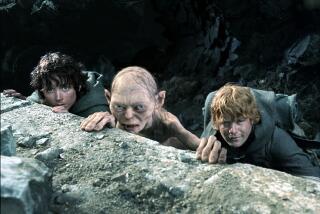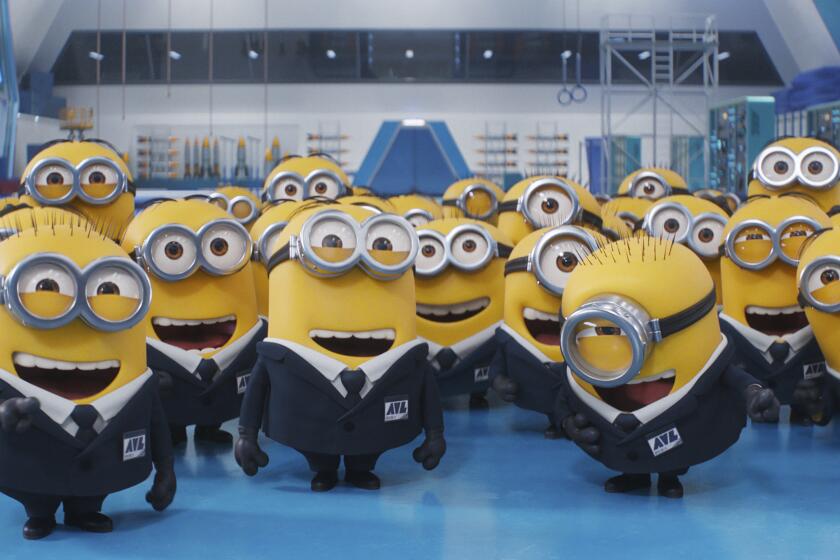Fantasy films? There’s truth in there too
Given a choice between Iraq and fairyland, it’s clear where moviegoers would prefer to spend time.
Despite the glut of politically themed movies on offer this season, audiences have embraced frothier fare: “The Golden Compass,” set in a parallel universe inhabited by comely witches and talking animals; fluffy musical romance “Enchanted,” which brings classic Disneyana to modern-day New York; and the dark animated adventure “Beowulf,” rife with decaying monsters and burnished gold dragons.
“Compass,” in fact, was No. 1 at the box office over the weekend. It pushed “Enchanted” to second place by earning an estimated $26.1 million in U.S. and Canadian ticket sales, New Line Cinema reported Sunday.
And all this comes on the heels of the huge success of the “Lord of the Rings” films, the “Harry Potter” franchise and 2005’s “The Chronicles of Narnia: The Lion, the Witch and the Wardrobe.”
A successful fantastic film artfully mixes the familiar and the fanciful. For all their extraordinary elements, the worlds of Harry Potter and Middle-Earth feel tactile and inhabitable, often more so than the airbrushed universe of the X-Men or Superman. Wedding childlike wonder to grown-up themes (with some teen-delighting combat along the way), the result, studios hope, is a demographic smart bomb whose revenue-generating powers never go out of style.
Fairy-tale endings aside, the fantasy world is not always a pleasant place. Harry Potter has lost one classmate and a surrogate father, and readers of the books know there’s more carnage in store. Even tranquil Narnia is beset by war.
“One’s always tempted to go the rather stock route of saying it’s escapist fare, and we really need that now,” says “Golden Compass” writer-director Chris Weitz, who adapted the film’s screenplay from Philip Pullman’s novel, the first installment in the author’s “His Dark Materials” trilogy. “But if you look at ‘Lord of the Rings’ or ‘His Dark Materials,’ they’re not really escapist inasmuch as they deal, at least in analogy, with some of the things that are going on in politics and society.”
“The best fantasy films reflect what is going on today,” adds David Heyman, currently producing next year’s “Harry Potter and the Half-Blood Prince.” “I think the Potter films reflect, in some form, issues of loyalty and trust and friendship, and of propaganda and misinformation and people not being prepared to see what is before them, wanting to see only what they want to see.”
Generating authenticity
The boom in fantasy films owes its existence, in part, to the growing power of computer-generated imagery. It’s hard to imagine what “Compass’ ” climactic polar-bear skirmish would have looked like 10 years ago, and previous attempts to film C.S. Lewis’ Narnia books were doomed by the clunkiness of their animal characters.
But writer-director Guillermo del Toro thinks that the surge has less to do with technology than topicality. Del Toro, who set his violent fable “Pan’s Labyrinth” against the backdrop of the Spanish Civil War, says that social traumas often find their most potent outlet in the world of fantasy.
“There is definitely a pressure-valve factor in the fantastic genres,” he says. “All of them -- horror, fantasy, science fiction -- serve as a way to both face deeper issues and/or escape from them. But I think that the fantasy films made in a particular time are either a distorted or a faithful image of the time they were created in. They are a mirror to reality, even if you’re trying to escape it.”
The stories behind these epic franchises draw on many of the same archetypes, which means some redundancy. Both “The Lion, the Witch and the Wardrobe” and “Golden Compass” feature friendly but imposing beasts voiced by British thespians, and “Golden Compass’ ” Jordan College bears more than a passing resemblance to Hogwarts.
More practically, “Compass,” like the Potter and Narnia films, was shot in London, and all three draw from the same pool of London-based talent. “Luckily, you never run out of great British theater actors,” Weitz says.
By and large, Weitz succeeds in establishing a distinct cast of characters, though the dueling wizards from “Lord of the Rings” turn up: Ian McKellen is the voice of the armored bear Iorek Byrnison, and Christopher Lee is a venomous high councilor.
“Lord of the Rings” was the first to demonstrate the box-office might of the fantasy genre, but producer Mark Johnson says the “Narnia” series owes its life, and particularly its fidelity to its source, to the Harry Potter films.
In the pre-Potter era, Johnson says, studios assumed that American children were unable to relate to British characters. His 1995 adaptation of Frances Hodgson Burnett’s “A Little Princess” was forcibly relocated from London to New York.
“After that, Harry Potter came along, and all those cultural or geographical lines were broken,” he says. “When ‘The Lion, The Witch and the Wardrobe’ was being developed at Paramount, the imperative was to set it in the U.S., and it just doesn’t hold. You can find some way to adapt it, but it’s not the book.”
If theater receipts are any indication, U.S. audiences prefer their fantasy with a British accent. Homegrown franchise starters like “Eragon” and “Lemony Snicket’s A Series of Unfortunate Events” underperformed, and an Americanized version of Susan Cooper’s “The Dark Is Rising” landed with a thud.
Pullman, like C.S. Lewis and J.R.R. Tolkien before him, studied at Oxford and has framed “His Dark Materials” as an attack on the covert religiosity of the “Narnia” series. But although cultural observers have been itching to parse “Compass” for Pullman’s avowed atheism, the irony is that, stripped of its more pointed references to the Catholic church, “Compass” closely resembles “The Lion, The Witch and the Wardrobe,” which itself underwent a face-lift to avoid spooking secular viewers.
Trying not to insult
“Compass’ ” villains still sport clerical garb, but the authority they represent has been reconfigured as a collection of totalitarian moralists, more like a strict parent than a disapproving priest.
“It’s there for people who want to see it, but it’s not there in a way that aggressively insults that individual viewer who happens to be a religious person,” Weitz says.
But Del Toro says fantasy films are inextricably bound up with spiritual issues, no matter how hard filmmakers may try to submerge them. “In the same way that no movie can be nonpolitical, these genre movies cannot avoid being somewhat spiritual. They can be a crass, failed exercise in spirituality. But no matter how much they try to avoid it, they are tackling subjects . . . rooted in spirituality.”
In a world dominated by rationality, Del Toro sees fantasy as the last refuge of the unknown, a place to address questions that still elude science.
“The more we get technology into our lives and the more we demystify our beliefs, the more we create a void,” he says. “As spiritual entities, we need to fill that with something, with some mythology or cosmology that allows you to believe in something beyond your next cellphone bill. . . . and the latest Nintendo game. I think that movies of the genre do that. They make the supernatural or the magical palatable to the supposedly jaded ‘here, now’ generation.”
More to Read
The biggest entertainment stories
Get our big stories about Hollywood, film, television, music, arts, culture and more right in your inbox as soon as they publish.
You may occasionally receive promotional content from the Los Angeles Times.






